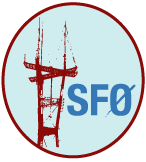
SFZero or SF0 is a web-based community game invented in San Francisco. It is a type of alternate reality game. SFZero players earn points by completing a wide variety of different tasks, often with a focus on creativity, exploration, community, or performance. Although the game was originally intended for San Francisco residents, its player base has expanded to include many other locales both in and outside of America. [1]
Contents
SFZero is the creation of Ian Kizu-Blair, Sam Lavigne and Sean Mahan of Playtime Antiboredom, a "nonprofit organization dedicated to producing free immersive art games that use new technologies in significant ways." [2]